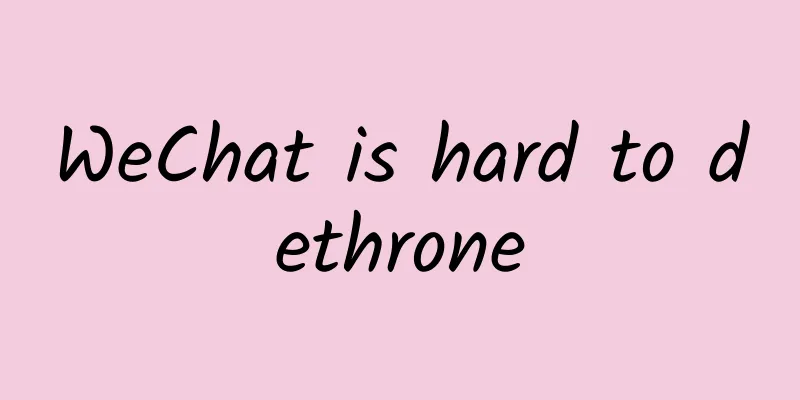WeChat is hard to dethrone

|
After the “Three Heroes’ Battle of WeChat”, WeChat has been increasingly challenged by being tied to the shackles of “Internet infrastructure”; internally, WeChat has become a deity and even a core capability of Tencent. Under the influence of huge traffic, WeChat has folded two worlds inside and outside Tencent.
Author | Shu Hong Editor | An Xin Xing Mo was upset about a failed interview two years ago. In 2017, just after the Spring Festival, Xing Mo was preparing to transfer to WeChat through Tencent's internal "Living Water Plan". After passing several levels, he unfortunately "failed" in the final interview. This was nothing. In last year's Tencent restructuring, Xing Mo was assigned to PCG (Platform and Content Business Group), responsible for a new project, and was slightly promoted. As the year draws to a close, BAT has tightened its strategy amid the wave of layoffs, and everyone is ready to stay together through the winter. It was not until January 25 that the news that "WeChat's year-end bonus is 2 billion, 2.8 million per person" went viral on social networks. Although the official rumor of "2.8 million" was rejected, the year-end bonus of the WeChat department did increase this year. Several Tencent insiders said that Zhang Xiaolong obtained an extra bonus package from Tencent's general office and raised the salary of WeChat employees four months in advance. In addition, the WeChat Mini Program team also received an additional bonus of 100 million yuan for being selected into Tencent's "Tour of Famous Products" in 2018. "We agreed to get through this difficult time together, but you quietly gave out red envelopes, iPhones, stock dividends, and salary increases." Someone inside Tencent complained. In the past year, with the exception of the WeChat business group, the year-end bonuses of many departments at Tencent have fallen by 15%-20%. At the WeChat headquarters in Guangzhou TIT Creative Park, Zhang Chi's WeChat address book has received more than a dozen friend requests in one day. Headhunters greeted him eagerly and recommended him various positions at ByteDance and Pinduoduo. In Guangzhou, some headhunters even moved directly into TIT to work on-site and recruit people. "In addition to WeChat, (Tencent) video and live streaming, most people often receive headhunting calls from Toutiao," said Zhang Chi. With the "external enemy" at hand, it is difficult to get off the tiger. In Tencent, the gaming department was the most frequently listed on the headhunter's list in the past. Creating the next "Honor of Kings" was once a way for Tencent people to quickly gain wealth growth. After QQ and games, WeChat was pushed to the top of the wave. In August 2018, WeChat had more than 1 billion daily logins, becoming a super app with 1 billion daily active users. WeChat is so big not only because of its instant messaging and social networking, but also because it connects a wide range of scenarios such as food, clothing, housing, transportation, finance, government affairs, etc. Its users, partners, and developer ecosystem are so huge that it far exceeds the outside world's perception of any other app. After the drama of “Three Heroes Fighting WeChat”, WeChat was challenged by being tied to the shackles of “Internet infrastructure”; internally, when WeChat became Tencent’s strategic outlet and core capability, the mission and pressure it carried also increased day by day. On Tencent’s intranet, a post titled “Will the General Office’s preferential treatment of WeChat cause a large number of outstanding people from other BGs to leave in 2019?” sparked discussion. Some employees believe that WeChat "helped the company get a ticket to the mobile Internet, and relied on this ticket to break through the limit point, temporarily avoiding the danger of falling behind, and it is reasonable for them to be treated preferentially." Some people also raised such questions: "Can the good of WeChat be achieved independently? Can it achieve such a level independently? If QQ had not helped to introduce the relationship chain, there would not be the rapid rise of WeChat. Games have the support of the game line, advertisements have the support of the advertising line, and WeChat payment has the underlying and license of FIT... Without this big system, how can there be WeChat?" Under the influence of huge traffic, there are two worlds folded by WeChat inside and outside Tencent - those who are close to WeChat survive, and those who are far away from WeChat have a hard time surviving. 1. Forever waiting list “The most annoying thing is that you are always on WeChat’s waiting list.” Three months ago, Cheng Ran’s department reported a problem of slow iOS payment jump to the WeChat team, hoping to get a solution. “As a result, at least three versions have been updated, and the problem still exists,” Cheng Ran said. In six and a half years, the number of daily active users of WeChat has grown from 100 million to 1 billion, and 45 billion messages are sent every day. As Zhang Xiaolong said, "500 million people complain every day, and 100 million people teach me how to make products." The mailbox of the WeChat development team is filled with countless requests every day. And each additional function of WeChat requires at least two months of scheduling, and it must also go through layers of review. At an annual WeChat conference, Tencent’s former CTO Zhang Zhidong once made a “criticism” of the WeChat team: WeChat’s directors prefer to hold back on big moves for a long time, eager to create features that amaze the industry, but for those short-cycle, low-tech pain points, they do not give high priority, and are easily delayed by various other tasks when scheduling versions. For example, WeChat is becoming increasingly bloated. Some users’ mobile phones even have up to 10G of memory, but WeChat’s message import and export capabilities are not as good as Foxmail developed by Zhang Xiaolong 20 years ago. WeChat has been online for eight years, but has not yet launched a cloud synchronization and backup function or tool. "Can you give us an interface so we can help you make it?" said a PCG developer. When traffic becomes the core value of WeChat, WeChat is also swept up by the traffic. In addition to instant messaging functions such as messaging, voice, and video, WeChat also has payment-related entrances such as red envelopes, financial management, life payments, and city services, which are directly connected to Tencent games, finance, QQ and other businesses. There are also a large number of third-party services in the WeChat grid. In the new round of organizational restructuring of Tencent, two new business groups, PCG and CSIG (Cloud and Smart Industry Business Group), were established to be responsible for content ecology and To B business respectively. Although the WeChat business group WXG has not changed, WeChat has assumed an important mission in Tencent's strategic business. According to a report from Lei Xiaoyu's channel, when Ma Huateng handed over the important task of To B business to CSIG President Tang Daosheng, he gave him a tip: provide him with various resources, including seeking the WeChat entrance from Zhang Xiaolong. "Pony has always been cautious about the WeChat entrance. Sometimes when other businesses try to get it, before Xiaolong even says anything, Pony has already jumped out and said it's not possible," said Tang Daosheng. Tang Daosheng described the fight for WeChat entrance as "clinging to someone's thigh", and WeChat also opened a limited-time promotion entrance to Tencent Weishi. In September 2018, WeChat added the option of "shoot with Weishi" under the camera icon button in Moments. Click it to jump to the Weishi shooting interface or download Weishi from the App Store. However, Weishi did not successfully revive. WeChat, with hundreds of millions of daily active users, has created many unicorns in vertical fields. For example, one of the important reasons why Didi Chuxing was able to beat its competitors including Uber was that it accepted Tencent's investment and quickly acquired a large number of users with the help of WeChat's social power. The rise of Pinduoduo and the community group buying model on WeChat has become a footnote to the success of social e-commerce besides Alibaba and JD. Travel and e-commerce are both extremely important tracks for Tencent. According to media reports, when Tencent was discussing the B round of investment with Didi, Cheng Wei, who came from Alibaba, was hesitant. Ma Huateng raised the price and gave up the voting rights, but Cheng Wei still refused to give in. So Ma Huateng took out his mobile phone, opened WeChat and said: "These positions can be used as entrances for Didi, if Zhang Xiaolong does not object." Over the past years, the expensive WeChat entrance has become an important bargaining chip for Tencent to invest in business and build an open ecosystem, and it has also become a new story for "allies" such as JD.com, Didi, 58.com, and Vipshop. At present, Tencent's videos, music, literature, animation, and WeChat-derived WeChat Reading, WeChat for Business, WeChat Phone Book, etc., have not obtained the first- or second-level entrance of WeChat. As WeChat becomes a platform, more and more departments are cooperating with WeChat. In terms of presentation, WeChat distinguishes between Tencent products and other products grafted onto the platform, with the latter classified as the entrance to "third-party services". However, WeChat insists on treating both internal and external important businesses equally in terms of priority. According to All-Weather Technology, in 2013, Tencent stopped using QQ Input Method due to its investment in Sogou. Soso and QQ Input Method were merged into Sogou, and WeChat has never placed QQ Input Method in WeChat dialog boxes. In the cooperation between Sogou and Tencent, there has always been a clause that Sogou can crawl WeChat ecosystem content. Unexpectedly, Sogou Input Method soon hit the ceiling, and the business focus began to shift to AI, and then QQ Input Method was restarted. "Tencent's problem is not that it has become an investment bank, but that it has tied its own hands because of investment. Many businesses cannot just be done internally, nor can they just rely on traffic to the outside world." A founder of a Tencent-affiliated company pointed out, "The communication cost of a large company is very high. In order to make this communication orderly, there must be process-based things, but WeChat needs to distinguish priorities more reasonably." As Tencent and its internal and external parties are fighting over a small box on WeChat, WeChat has become a "brother" that does not recognize any relatives. 2. In the shadow of WeChat “In fact, among Tencent employees being poached, WeChat is not the most powerful one.” Li Hua, Tencent’s 18th employee and founder of Futu Holdings, pointed upstairs and said, “For game developers, poaching planners or a project team are the ones who can really bring you cash flow. What’s the point of poaching employees from a platform?” The offices of Tencent’s gaming department and Futu Networks are both located in Kexing Science Park in Nanshan District, Shenzhen. "Zhang Xiaolong is the soul of WeChat," Li Hua told All Weather Technology. "Whether to launch this function or why the shake function should be designed in a certain way is a question of many drafts for him to choose from, and the final decision must be made by Zhang Xiaolong. This is the culture of Tencent. The person selected is tested on his ability and experience. A and B may be similar, but the final results presented are very different." From the PC era to the mobile era, the Guangyan team led by Zhang Xiaolong stood out from Tencent's internal horse racing and became the spiritual symbol of WeChat and even Tencent. Since then, it has been the only one in the mobile Internet. "WeChat is a lifestyle", "A good product is one that you use and then discard" - Zhang Xiaolong has also successfully made himself a screen-sweeping presence in the WeChat Moments.
WeChat headquarters in Building B3, located in Guangzhou TIT Creative Park, where Zhang Xiaolong works WeChat was founded 8 years ago, and still maintains a size of more than 2,000 people among Tencent's more than 40,000 employees. Zhang Xiaolong said that for an excellent team, fewer people are better than more. WeChat has always maintained a small team mentality to avoid falling into bureaucracy and process. "We used to ban writing PPTs, thinking that it was a manifestation of formality. This is a bit arbitrary, but the goal is to maximize efficiency. We will continue to limit the number of people we recruit and only recruit capable people to join the team." WeChat has a technical committee and an interview committee, with more than 50 technical and product management members including Zhang Xiaolong. Whether recruited from the society or internally, joining WeChat is not an easy task. During the interview, many Tencent employees still believed that WeChat is currently the organization that best reflects the product culture on which Tencent relies for its success. In 2015, Tencent established the "Famous Product Hall" to encourage product innovation. The annual selection of the "Famous Product Hall" is considered a high honor within the company. Except for 2017, the WeChat Business Group has products selected into the "Famous Product Hall" every year, including WeChat Public Platform in 2015, WeChat Pay in 2016, and WeChat Mini Programs in 2018. According to a Tencent technical staff, “WeChat is not as arrogant as the legend says, with eyes on the top of its head, and it doesn’t even reply to messages.” This staff once reported a product type issue in WeChat usage to the WeChat team, and “I got a timely reply on the same day, Friday night.” "Many of the WeChat team's product ideas have been regarded as the benchmark by the industry. At the same time, WeChat has a deep understanding of user experience. For example, WeChat used a small incision such as red envelopes to trigger a boom during the Spring Festival, which immediately revitalized the WeChat payment strategy, not only achieving commercial success, but also providing great convenience for users." A relevant person in charge of ByteDance said, "We hope that the team can also have such keen insight." However, the brighter WeChat shines, the more solid this product culture with WeChat as the core of "power" becomes. Innovation will disrupt the existing resource allocation and product focus, and under limited resources, WeChat is undoubtedly the most favored one. WeChat is the only one under Tencent. "In the past, when people were making Internet products, they would ask what to do if Tencent got involved. Now that Tencent is making its own products, some people will ask, what if Zhang Xiaolong gets involved?" said Xing Mo. On April 18, 2018, Ma Huateng praised the multi-person collaborative online document released by the QQ team - Tencent Docs. This is a product that Ma Huateng believes should have been made eight years ago. Ma Huateng said that at that time he hoped that the Guangyan team would develop Tencent Docs, but "Guangyan gave up on it after it completed WeChat", until the QQ team unexpectedly submitted this answer sheet and also made a mini-program version of WeChat, opening up the editing and sharing capabilities of multiple platforms such as QQ, WeChat and PC. Tencent Docs was launched more than four years later than Shimo Docs, which was invested by Toutiao. However, WeChat said that Tencent had already had online documents for email before that. Another example is that when it comes to WeChat Pay’s overseas business, Tencent has two teams: the WeChat team is responsible for Chinese users’ outbound travel, while the Tencent Financial Technology (FIT) team is responsible for WeChat Pay’s local wallet. Focusing on outbound tourism is WeChat's priority choice for overseas business. WeChat has limited resources and manpower, and financial localization faces the difficulties of a large amount of funds, licenses, overseas supervision and social relationship chains, and the input-output ratio is not high. Limited by the challenges of social circles, the WeChat Pay local wallet managed by the FIT team is currently only tested in the Guangdong-Hong Kong-Macao Greater Bay Area. In 2014, after WeChat red envelopes became famous, WeChat Pay became independent and was placed under Zhang Xiaolong's command as the WeChat Business Group was established. Since then, Tencent's financial payment-related businesses have been divided into two separate parts: WeChat Pay under the WeChat Business Group, and FIT, where WeChat Pay's underlying Tenpay is located (currently under the CDG of the Corporate Development Business Group headed by Martin Lau). On January 15, three apps were banned by WeChat at the same time. Luo Yonghao showed the download page of Chatbot at the launch conference. The 2010 "3Q War" is considered a watershed for Tencent's move toward openness. The following year, WeChat was born, seizing the core position in the social battlefield. On one side is the relationship chain of over 1 billion users accumulated over the years, and on the other side is the prosperous business ecosystem formed based on the open strategy, which eventually formed a situation where "ants can hardly shake the elephant" - no matter what other social software you chat on, you can add each other on WeChat. At the beginning of 2019, the battle of social networking started again. On January 15, Wang Xin and others shouted that "the world has suffered from WeChat for a long time", and three social apps, Duoshan, Chatbao, and Matou MT, were released at the same time. I thought it would be a multi-headed fight, but I didn't expect WeChat to end up with a triple kill. On January 26, WeChat issued an announcement that explicitly prohibited testing and inducing external links, naming apps that violated the rules, including Toutiao, NetEase Cloud Music, Tencent-affiliated JD.com, and Didi Chuxing. Baidu Red Packet and TikTok, the most frequently appearing sponsors during the Spring Festival Gala, were blocked by WeChat. "WeChat directly blocked the link to TikTok and prohibited new users from logging in through WeChat accounts." A relevant person in charge of ByteDance told All Weather Technology that there was a competitive relationship between mobile operators and WeChat at the time, but there had never been a situation where operators did not allow the use of mobile phone numbers to register for WeChat. The controversy over whether WeChat is "Internet infrastructure" has triggered a discussion on whether WeChat has been "publicized". However, from a business logic perspective, the so-called "ban" is not uncommon among Internet giants. Taobao, Tmall and WeChat have long closed their doors to each other, and Toutiao itself has also banned third parties such as Weibo and WeChat. "WeChat is not an infrastructure." Li Hua gave an example: "It's like two good friends. Every morning, A brings B an apple. One day, A suddenly stops bringing an apple. B says, 'No, you don't care about me anymore. You're not good to me.' This logic doesn't work." What is certain is that in the era of mobile Internet, the size of WeChat has almost blocked the path to success for all entrepreneurs in the social field. In the early years, WeChat was able to defeat its then rivals Kik and MiChat and rise rapidly. Tencent's social genes and QQ's user base provided an innate advantage. However, other social apps had to go through a difficult initial accumulation, which was the fate of competitors. In addition to social networking, with several revisions, WeChat's intention to fully control the entrance to the mobile Internet has become increasingly obvious. On May 17, 2017, WeChat launched two new features, “Search” and “Take a Look”, in version 6.5.8 of WeChat. Users can use “Search” to quickly find content or services in WeChat, while “Take a Look” provides users with hot information of interest. Before the release of this version, the Search Application Department was established under the WeChat Business Group, which is responsible for WeChat's search business, reading recommendation business, AI technology research and implementation, WeChat data platform construction and data capability application. According to the information revealed in the 2019 WeChat Open Class, WeChat plans to further open up the search function this year. In the PC era, search was once the super entrance; on the mobile side, WeChat began to challenge information flows such as Baidu and Toutiao, and thus became the "gatekeeper". 3. Why is WeChat elegant? "The game is yours, but I set the rules." This line from Li Yifeng in the movie "Animal World" was quoted in Zhang Xiaolong's speech at the WeChat Annual Meeting on January 25. In this internal speech, Zhang Xiaolong said: "Regarding the word 'fighting', I feel very touched, because work is actually a war. I wrote a sentence a few years ago, what I like is not the product, but the war. A team must have enemies to feel like fighting. I think a person must fight many battles to truly grow up." Afterwards, this content from the official WeChat business group account was deleted, but Li Yifeng's fans spread the news on Sina Weibo. WeChat does make the rules of the game. From the small things like the word count of WeChat public account articles to the big things like WeChat functions and entrances, WeChat is the only rule maker. A developer of small games told All Weather Technology: "The rules of small programs change too quickly. Often, products made under the previous rules will not pass the review next time, and the initial investment will be wasted in an instant. It is difficult for a single small program to succeed, but no one knows which one will be the best. It needs to be eliminated and refined by the market. From the results, it is still the leading e-commerce and game manufacturers that have jumped to the forefront. (Mini programs) have also become the territory of the big guys." WeChat is known for its restrained and elegant product culture. To some extent, strict restrictions on rules maintain its elegance. For example, when WeChat was about to launch advertising in 2015, Zhang Xiaolong opposed it and tried his best to integrate advertising into the information flow of WeChat Moments to protect the user experience in a limited way. In early 2017, WeChat and Starbucks jointly launched social gift cards, which was considered a major shift in WeChat’s commercialization. Because some product managers were initially reluctant to create a prominent feature for a corporate brand, the cooperation with Starbucks took nine months to achieve. In 2018, WeChat focused on smart retail and became a key part of Tencent's Smart Retail Strategic Cooperation Department. It began to build platforms for Tencent's social advertising, cloud computing and other businesses, and also provided more services to consumers. Zhang Xiaolong said: "Since its establishment, the WeChat team has never aimed at KPIs." But an important signal is that as game growth encounters obstacles, Tencent as a whole is increasingly relying on WeChat for monetization. Tencent disclosed in its Q3 2018 financial report: driven by the growth of WeChat Moments and Mini Programs, social and other advertising revenues in the third quarter surged 61% to 11.157 billion yuan. The growth of social advertising is closely related to WeChat's "decentralization" and the rapid growth of mini-programs. In an internal communication, the WeChat team introduced that in recent quarters, a lot of Tencent's revenue growth came from WeChat. For example, the mobile game market is growing rapidly, and WeChat is an important source; in the third quarter of 2018, 60%-70% of the growth of social advertising came from WeChat, such as the access to public accounts and mini-program advertising. The mini program team is also concerned about how much money developers can make. At the 2019 WeChat Open Class, WeChat said that in 2019, mini programs will focus on commercialization in three aspects: mini program incentive videos, interstitial ads, and personal mini program monetization. Of course, WeChat’s profitability is not an isolated incident. As business collaboration deepens, other businesses that have grown up under the WeChat ecosystem are also bringing cash flow to WeChat. For example, in terms of WeChat games, the Tencent game team and WeChat share the profits in proportion. IEG's high-quality games and App Store's co-operated games have to pay tolls on the WeChat login system; and no matter where you download "Honor of Kings" from, as long as you log in with WeChat, part of the money you spend on buying skins will go to WeChat. Although commercialization and user experience are not completely contradictory, some entrepreneurs on Zhihu pointed out that WeChat has gradually lost its stunning beauty and is becoming a conventional mobile product of a large company. It has given up its huge social dream and returned to the conventional route, drinking and chatting with partners and company partners. Data source: Tencent financial report, compiled by Jianzhi At the WeChat Open Class on January 9, Zhang Xiaolong emphasized that "WeChat has no competitors" and "WeChat has no anxiety." However, it is not difficult to see that many changes in WeChat 7.0 were made in response to competitive pressure. To sum up, WeChat 7.0 has the following changes: it opens up the channels between friend relationships and information, providing more accurate information recommendations; at the same time, it further strengthens the payment attributes of WeChat and taps into potential WeChat payment users; in addition, it also takes advantage of the Spring Festival traffic to strongly implant short videos. Chen Yongwei, a researcher at the Center for Market and Network Economy Research at Peking University, believes that "Look" and "Video Updates" are responses to information flow and short videos. However, in order for WeChat to maintain its original style and retain old users, this implantation cannot be too obvious or abrupt. "Good-looking" replaces "like" and is an information flow based on social foundation. However, the subjective "take a look" can easily evolve into a purposeful recommendation and traffic grabbing. From the current situation, "Video Status" has not exploded in the circle of friends as expected. One user said: "Few people use video status. There are more than 1,000 friends in the address book, but few use it. WeChat group seems to be a place where video status is concentrated. Some colleagues don't know the status and post some short videos, but they are about people and things in their own family. As a result, it is very embarrassing because it is shown in the group." 4. Lost Internationalization WeChat was once regarded as a successful international product of Tencent and was highly anticipated. According to an insider of Tencent, in 2012, Tencent approved a budget of 2 billion for WeChat's internationalization, but "the progress was still slow." According to the statistics of "Most Popular Instant Messaging Tools in Various Countries in 2018" released by SimilarWeb, instant messaging tools are dominated by two giants, WhatsApp Messenger and Facebook Messenger, globally. There are many reasons for the failure of WeChat's internationalization. For example, internationalization was led by the Corporate Development Group (CDG) at the time, not WeChat. In addition, WeChat only appeared in 2011, and when it began to layout overseas markets in 2012, it had missed a good opportunity. When many countries did not have social software yet, WhatsApp, which appeared in 2009, successfully acquired seed users; and although Line, launched by NHN's Japanese subsidiary, was later than WeChat, it had already laid out the Southeast Asian market early and took over the Southeast Asian social software market, which was still blank at the time. "In the first few years after the birth of WeChat, internationalization was not a business priority, and WeChat did not put too much effort into localizing each international market." The above-mentioned person said that the core competitiveness of mobile social applications lies in the social relationship chain, which requires negotiating and establishing cooperation with thousands of companies around the world, which is extremely costly. If we count the cases of Chinese Internet companies going overseas in the past few years, they are mainly concentrated at the tool or product level, but there are few achievements in products with content and social attributes. There are also no "universal" products like Facebook, Twitter, and Instagram that sweep the world. Seven years ago, when Toutiao was just established, one of Zhang Yiming's most concerned topics was the globalization of WeChat. He expressed his high recognition of WeChat's global product capabilities and even used the English version of WeChat himself. Since 2018, Zhang Yiming has emphasized the globalization strategy in many public speeches and accelerated international acquisitions. Will the internationalization that has been stranded by WeChat be an opportunity for competitors? (At the request of the interviewees, Xing Mo, Zhang Chi, and Cheng Ran are pseudonyms in this article) This article comes from All Weather Technology (ID: iawtmt) |
<<: Interpretation of new features of Android 10 system
>>: Apple makes concession: iPhones with batteries you’ve replaced can also be repaired
Recommend
Misunderstood "emotional intelligence": judging emotions through micro-expressions is indeed a science
Leviathan Press: "A wise man is honest and r...
iPhone/iPad will also have TouchBar. Is this thing so good?
For the Macbook Pro 2016 released last year, I bel...
Teacher Qi's "Physical Store Douyin Account Traffic Growth Operation Course" systematically learns the methodology of Douyin account operation
Training course video lecture content introductio...
With large-scale sandstorms approaching, how are sandstorms classified? What are the criteria for issuing sandstorm warnings?
Whenever the weather turns warmer, some relativel...
There are so many green radishes in the world, but isn't there a single one that blooms?
As one of the most successful indoor cultivated p...
How to wake up a sleeping user
In the field of mobile Internet , CAC (Customer A...
How to plan creative materials for high-conversion information flow ads? Avoid these 4 mistakes!
Before talking about what is good information flo...
「Black Hat SEO Optimization」Achao SEO has a complete set of SEO optimization processes for foreign trade websites!
"Black Hat SEO Optimization" Achao SEO ...
91 Ten New Energy Vehicle Industry Briefs: Mercedes-Benz’s contribution to BAIC’s revenue reached 95.9%
1. Lexus expects that by 2025, all of its models ...
Why do ducks stand still in the rain when it rains? | Expo Daily
Why when it rains, The duck just stood there in t...
5 core strategies for rapid growth of Taobao stores
For brands that have just started their business,...
How to leverage information flow for marketing? Use these tricks from Durex!
On Marketing by Leveraging Trends Durex is second...
3 reasons and solutions for the current low app opening rate
The open rate is a KPI indicator that all operati...
MDSA offline open class will help you decipher high-performance APP development
With the fragmentation of people's demand for...









